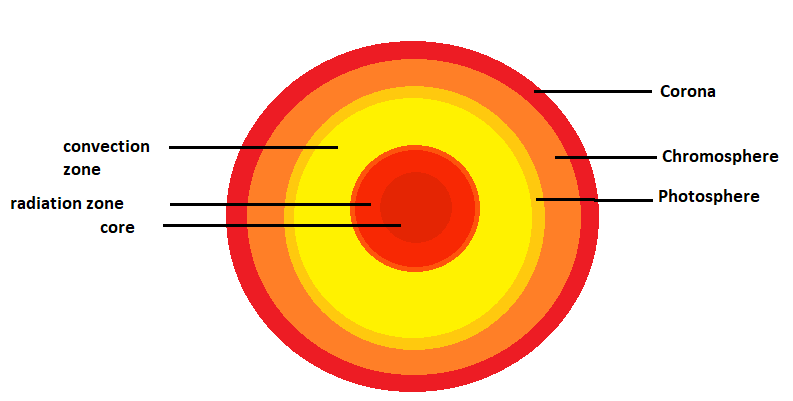
The innermost part of the sun is called:
A. Corona
B. Core
C. Chromosphere
D. Photosphere
Answer
606.9k+ views
Hint: For this question, we need to remember different parts of the sun that is the core, photosphere, chromosphere, and the Corona. We also need to know each of their properties. Then we need to know that the core is the hottest and the innermost layer of the sun.
Complete Step-by-Step solution:
The environment of the Sun is composed of various parts, mainly the chromosphere, corona, and the photosphere. In these outer layers, the energy of the Sun is present, which has risen up from the Sun's internal layers and is identified as sunlight.
The core of the Sun is extended from the center to about 20 to 25 % of its solar radius. It is the hottest portion of the Sun and of the whole Solar System, which is composed of hot, dense gases in their plasma state. Throughout the life of the sun, all the significant amount of energy has been produced by nuclear fusion in the core region by a series of nuclear reactions.
The deepest layer of the Sun's environment is the photosphere, the layer beneath which the Sun becomes opaque to the visible light. This is the layer where the energy of the sun is released as light.
The next to this layer we have the chromosphere layer. The chromosphere is visible as a red glow at the beginning and end of total solar eclipses because of the highly heated hydrogen burns. The temperature of this layer increases continuously with altitude.
The third layer of the Sun is the corona. It can be seen when a total solar eclipse occurs. It appears as white plumes of ionized gases that stream outward into space.
The innermost part of the Sun is called the core. So option B is correct.

Note: For these types of questions we need to remember about different parts of the sun and earth. And we also need to remember about their atmosphere and what is inside their surface. Then we can easily answer the question.
Complete Step-by-Step solution:
The environment of the Sun is composed of various parts, mainly the chromosphere, corona, and the photosphere. In these outer layers, the energy of the Sun is present, which has risen up from the Sun's internal layers and is identified as sunlight.
The core of the Sun is extended from the center to about 20 to 25 % of its solar radius. It is the hottest portion of the Sun and of the whole Solar System, which is composed of hot, dense gases in their plasma state. Throughout the life of the sun, all the significant amount of energy has been produced by nuclear fusion in the core region by a series of nuclear reactions.
The deepest layer of the Sun's environment is the photosphere, the layer beneath which the Sun becomes opaque to the visible light. This is the layer where the energy of the sun is released as light.
The next to this layer we have the chromosphere layer. The chromosphere is visible as a red glow at the beginning and end of total solar eclipses because of the highly heated hydrogen burns. The temperature of this layer increases continuously with altitude.
The third layer of the Sun is the corona. It can be seen when a total solar eclipse occurs. It appears as white plumes of ionized gases that stream outward into space.
The innermost part of the Sun is called the core. So option B is correct.

Figure 1
Note: For these types of questions we need to remember about different parts of the sun and earth. And we also need to remember about their atmosphere and what is inside their surface. Then we can easily answer the question.
Recently Updated Pages
Master Class 10 Computer Science: Engaging Questions & Answers for Success

Master Class 10 General Knowledge: Engaging Questions & Answers for Success

Master Class 10 English: Engaging Questions & Answers for Success

Master Class 10 Social Science: Engaging Questions & Answers for Success

Master Class 10 Maths: Engaging Questions & Answers for Success

Master Class 10 Science: Engaging Questions & Answers for Success

Trending doubts
What is the median of the first 10 natural numbers class 10 maths CBSE

Which women's tennis player has 24 Grand Slam singles titles?

Who is the Brand Ambassador of Incredible India?

Why is there a time difference of about 5 hours between class 10 social science CBSE

Write a letter to the principal requesting him to grant class 10 english CBSE

A moving boat is observed from the top of a 150 m high class 10 maths CBSE




